Apr 23, 2025 – Day 66 of 100-Day Dharma Talk , Religious Leaders’ Meeting, Weekly Dharma Assembly, Peace Research Seminar
Hello. Today is the 66th day of Venerable Pomnyun Sunim’s 100-Day Dharma Talk. We have already passed two-thirds of the 100-Day Dharma Talk. Lanterns adorning the streets signal the approaching Buddha’s Birthday.
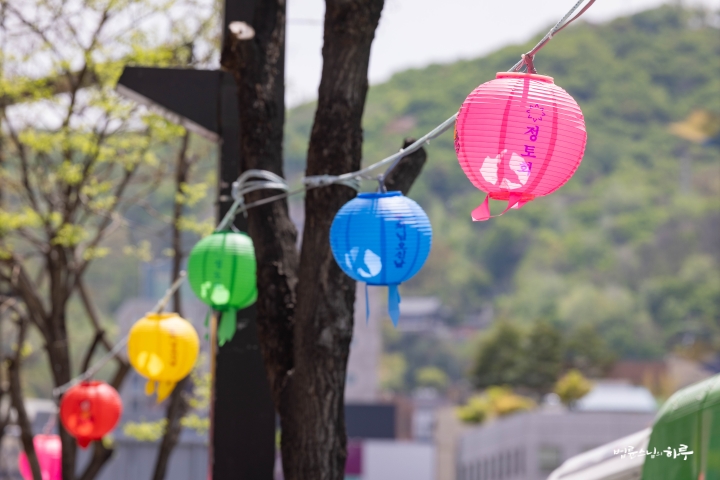
Today is the monthly meeting of religious leaders for national reconciliation and peace. It is also the day for the Weekly Dharma Assembly where Jungto Society members examine their practice.

After completing his morning practice and meditation, Sunim headed to the Jungto Social and Cultural Center for the religious leaders’ meeting. Pastors, priests, bishops, religious directors, and ministers arrived one by one at the basement dining hall.
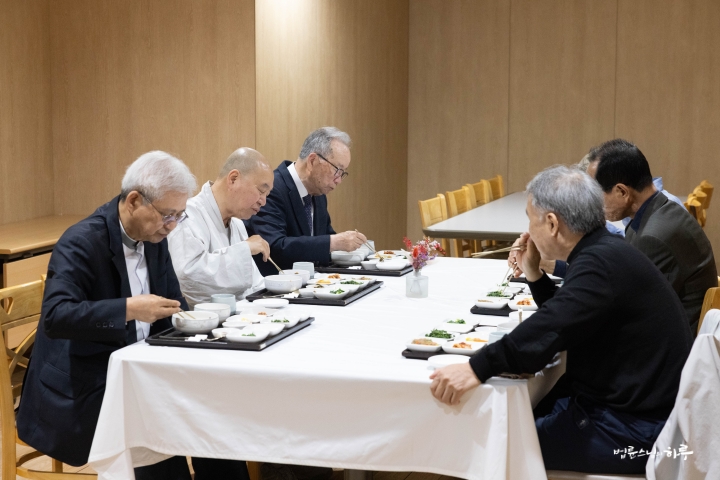
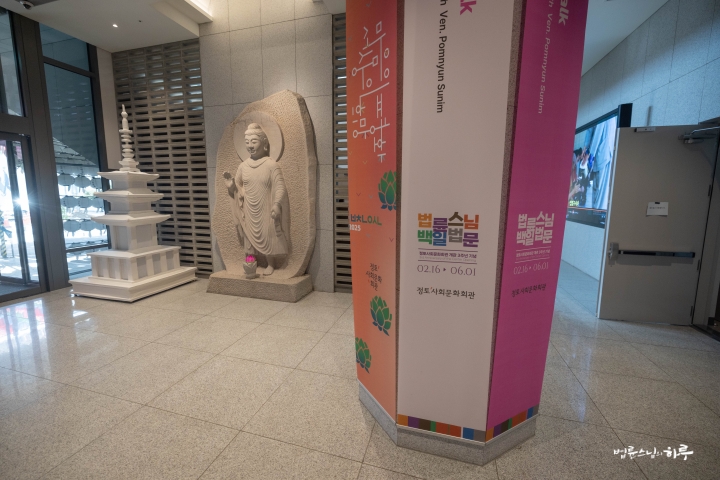
After enjoying breakfast prepared with care by The Peace Foundation staff, they moved to the foundation’s meeting room to continue their discussion.
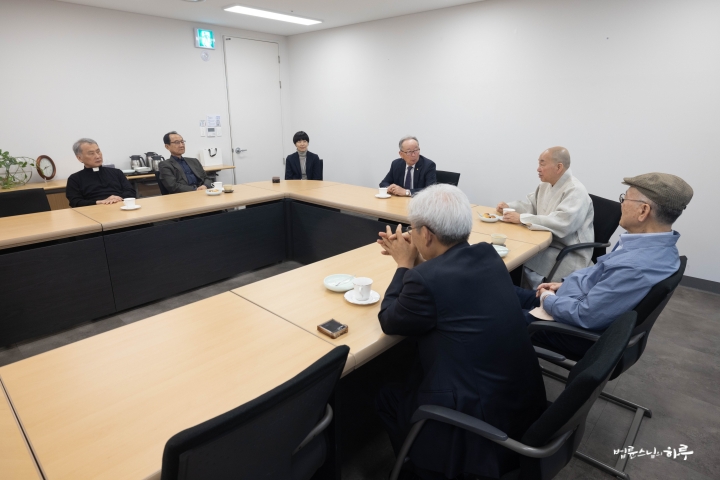
First, Park Nam-soo, the chairperson of the religious leaders’ meeting, gave opening remarks.
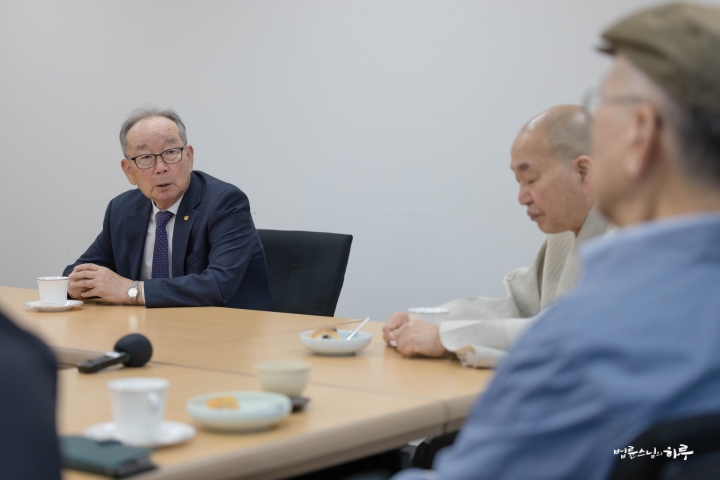
“The national turmoil that began with the December 3rd martial law declaration was temporarily resolved with the Constitutional Court’s ruling to impeach the president on April 4th, and now we are facing a new presidential election. This is truly a critical time. In Cheondogyo teachings, the second leader Choi Gyeongsang changed his name to Choi Sihyeong, saying, ‘How can I be a leader if I don’t know the right time and don’t know how to utilize it?’ Now is when we most need the wisdom to recognize the right time and know how to utilize it. I hope we can discuss this extensively today.”
Sunim then shared his recent meeting with several social elders where they discussed the current political situation.
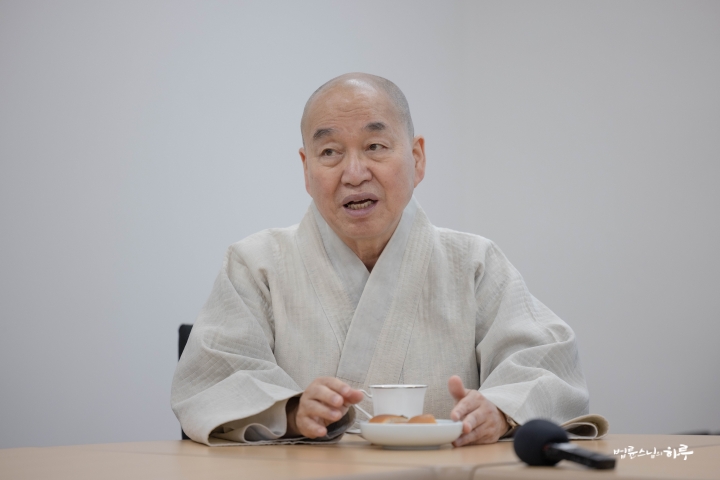
“Last week, I met with several social elders to discuss the current political situation. Since it’s now too late to amend the constitution to reduce presidential powers before the election, we focused on how to overcome national division after the election. Many expressed that rather than supporting one side, social elders should consistently speak from a neutral position to promote national unity. There was concern that without regular voices calling for national unity starting in the latter half of the year, our national discourse might become even more divided.
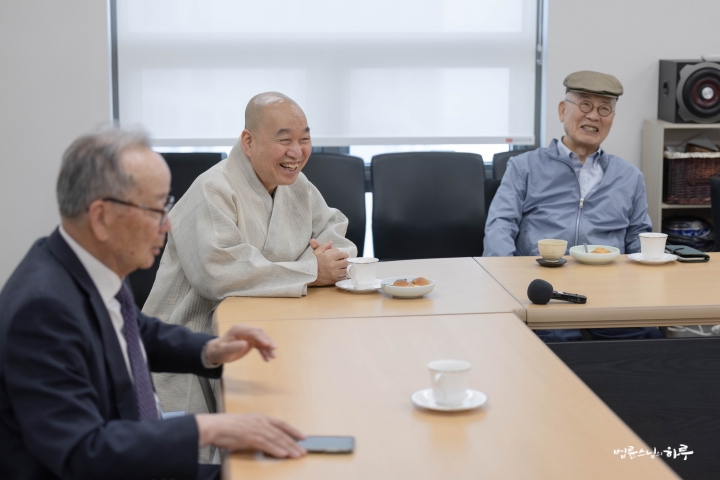
What role should religious leaders play in preventing national division?
To prevent national division, when a conservative government is in power, conservative social elders and intellectuals should criticize government mistakes, and when a progressive government is in power, progressive social elders and intellectuals should offer criticism. While it’s easy to criticize the opposing side, it’s difficult to criticize one’s own side. Nevertheless, our society needs to develop a culture where people can criticize those close to them when they become dogmatic, in order to maintain social balance. The question is whether our religious leaders’ group can play this role. Unfortunately, in Korean society so far, when a conservative government takes power, conservative elders and intellectuals remain silent, and the same happens with progressives.
In the United States, we’re witnessing President Trump wielding presidential powers arbitrarily, and because Republicans hold the majority in Congress, they remain silent, making a democratic country like the United States operate almost like a dictatorship.
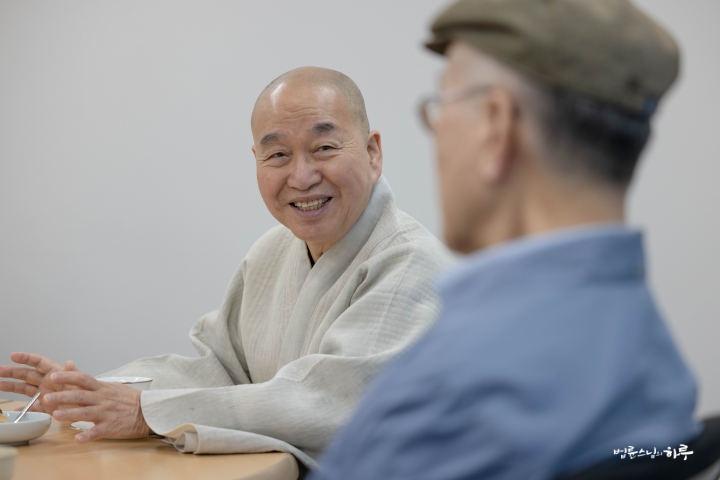
And the inter-Korean and North Korea-US relations still appear to be stagnant without clear progress. As President Trump pushes forward with tariff negotiations and faces global resistance, the North Korean issue has become quite minor. President Trump also claimed that the war between Russia and Ukraine could end soon, but currently there seems to be no easy resolution in sight. In this period of transition, further discussion is needed about what role religious leaders’ gatherings should play.”
The religious leaders shared various opinions about their role while observing the current political situation. Reverend Park Jong-hwa expressed concerns about the prevalent “pro-North Korea” framing in Korean society.
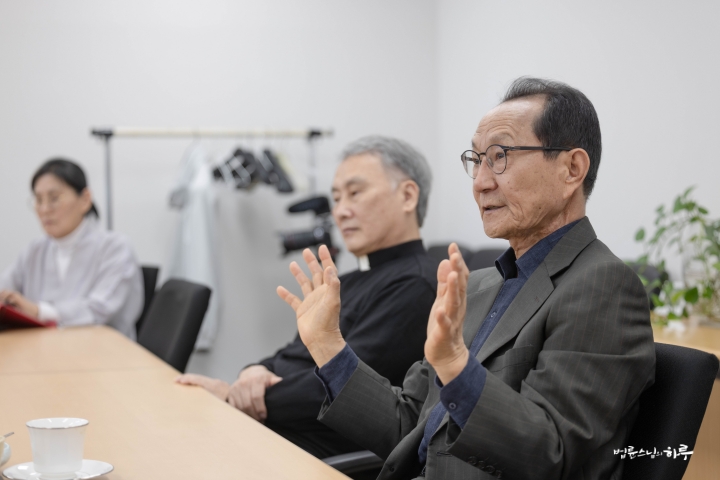
“Our society suffers from extreme income inequality. When someone suggests even slightly reducing this gap, they are immediately labeled as pro-North Korean. The privileged groups—conglomerates, media, and others—have controlled Korean society for so long that anyone who advocates for a more equal world gets branded as a communist. Breaking free from this ‘pro-North Korea’ frame seems quite challenging.”
Bishop Park Kyung-jo also spoke about the direction for the religious leaders’ gathering.
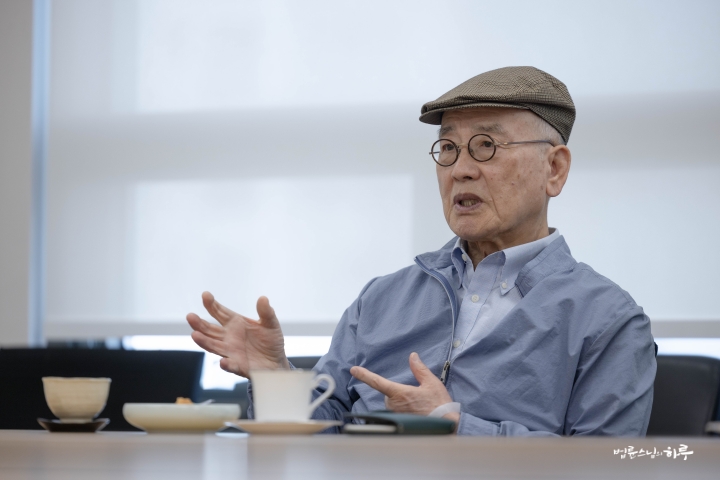
“The top priority for our religious leaders’ gathering must be that war on the Korean Peninsula is absolutely unacceptable. I believe this has been our consistent position all along. Next is creating a world where prosperity is shared equally. When you look deeply, there are so many people suffering. If the new administration fails in this regard, I believe we must raise our voices in criticism.”
Reverend Park Nam-soo also shared his opinion.
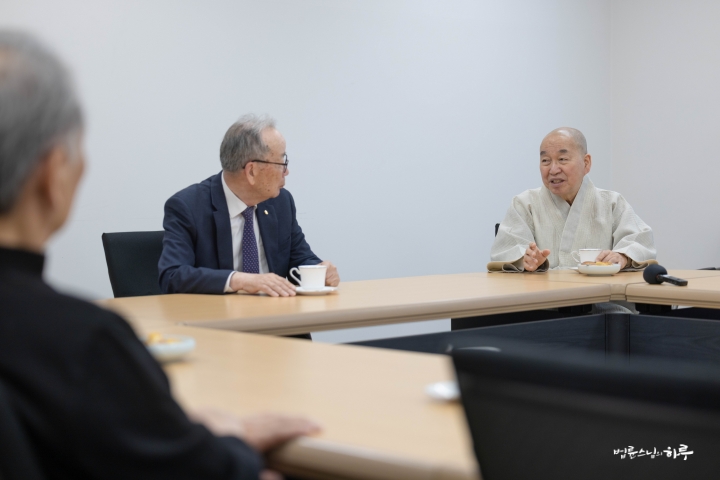
“The fundamental cause of South-South conflict is the division between North and South Korea. Therefore, I believe we must continue to speak out for peace on the Korean Peninsula. Domestically, it would be good if even just a few people steadily worked toward constitutional reform for national unity. Though difficult, this seems to be a time when we need to lay even just one brick at a time.”
After two hours of discussion, Sunim summarized the content and clarified what role the religious leaders’ gathering should play going forward.
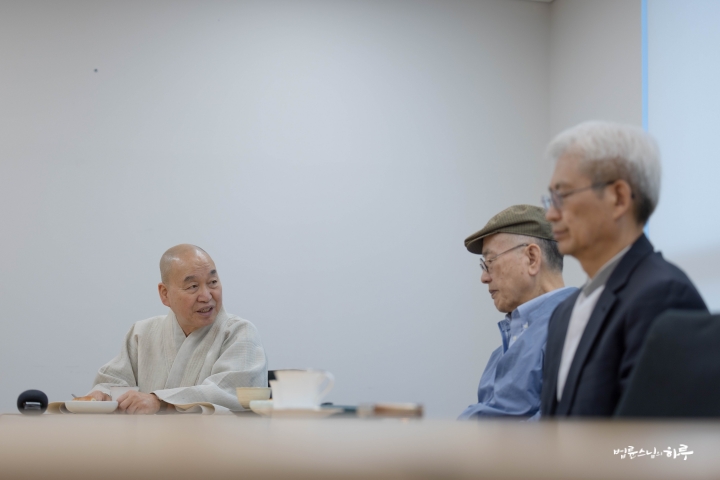
“The main purpose of our religious leaders’ gathering is to achieve reconciliation and peace for our people. We have been working to facilitate dialogue between North and South Korea. Second, achieving national unity within South Korea has been a major task. At one point, didn’t we organize ‘Reconciliation and Coexistence Forums’ to bring politicians from ruling and opposition parties together for dialogue to prevent deepening conflicts? Recently, when meeting with senior figures in society, many expressed the need for a neutral voice that doesn’t take sides.
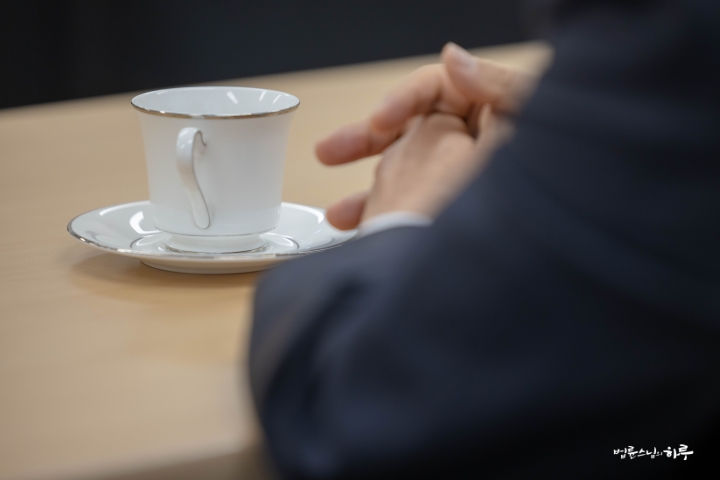
The third task is constitutional reform to partially distribute presidential authority and strengthen local autonomy. This is an issue our religious leaders’ gathering has consistently discussed for the past ten years. However, this task requires the combined efforts of various sectors of our society and needs substantial preparation. Therefore, I suggest we discuss this further at our next meeting once the domestic political situation has settled somewhat.”
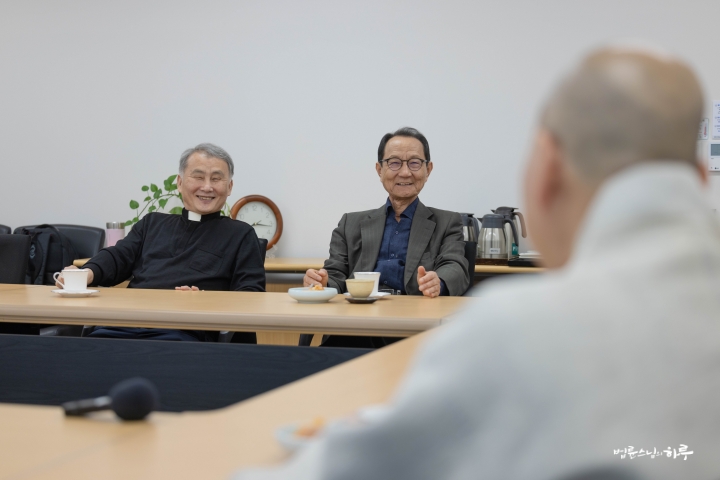
After concluding the religious leaders’ gathering, each person recorded a video message celebrating Buddha’s Birthday. These pre-recorded messages would be shown to Jungto Society members on Buddha’s Birthday.
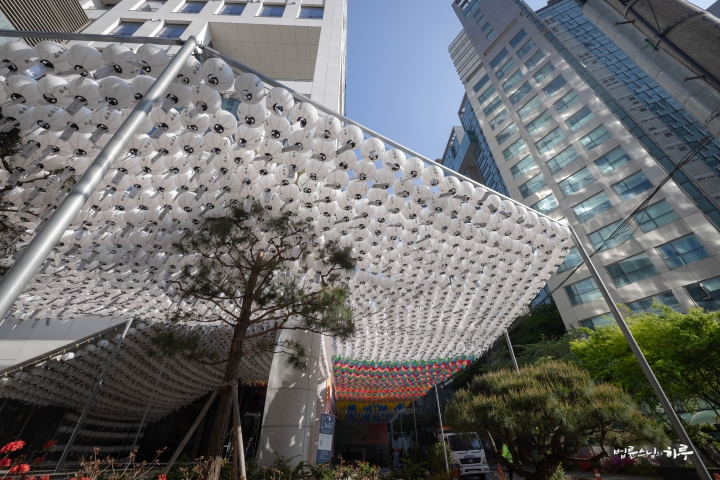
After seeing off the religious leaders, Sunim headed to the Dharma Hall on the third floor. In the hall, the morning service had been conducted from 9 AM for an hour, and now the space was being tidied up briefly.
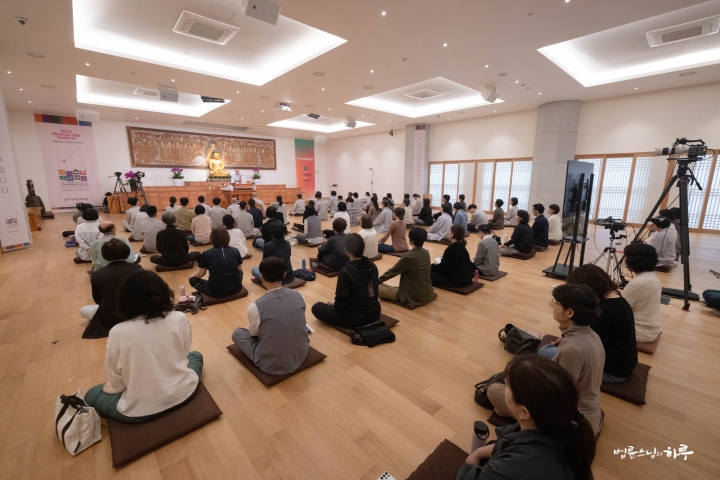
At 10:15 AM, with about 140 people gathered, the Weekly Dharma Assembly began with the recitation of the Three Refuges and the Heart Sutra. Jungto Society members also joined online through a video conference. The assembly paid respect to Sunim with three bows, requesting his Dharma teaching.
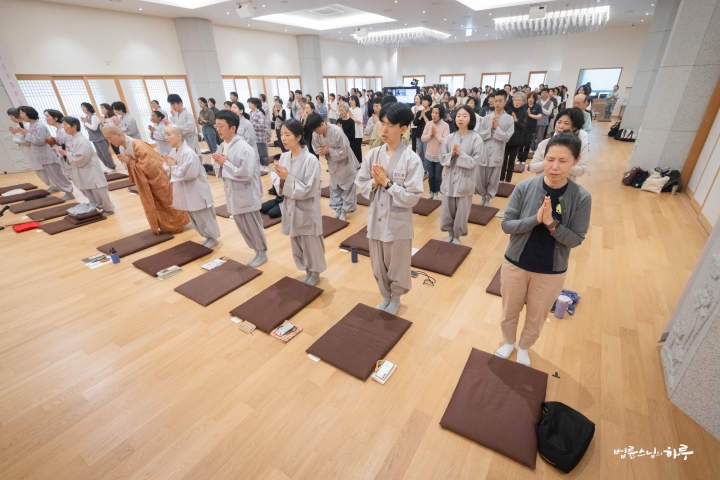
Sunim began his Dharma talk by commemorating Pope Francis, who had passed away on the 21st.
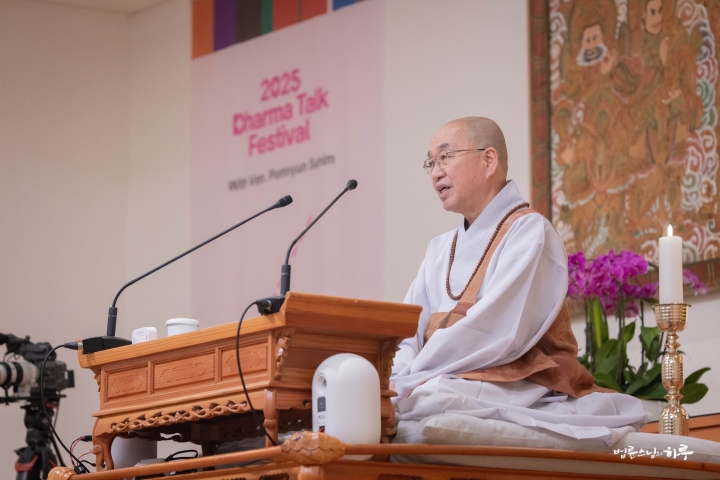
“This week brought sad news that left us with regret. Pope Francis, a friend to the poor and a guardian of peace, has passed away. The world today is in a precarious situation, with conflicts and divisions escalating into wars. Wars continue in various parts of the world, the gap between rich and poor deepens daily, and discrimination against immigrants remains prevalent. In such times, I wish Pope Francis could have remained with us longer as a symbol of inclusion and solidarity. However, no one can turn back time. As we mourn Pope Francis’s passing, I hope we can all join together in wishing him to rest in peace”
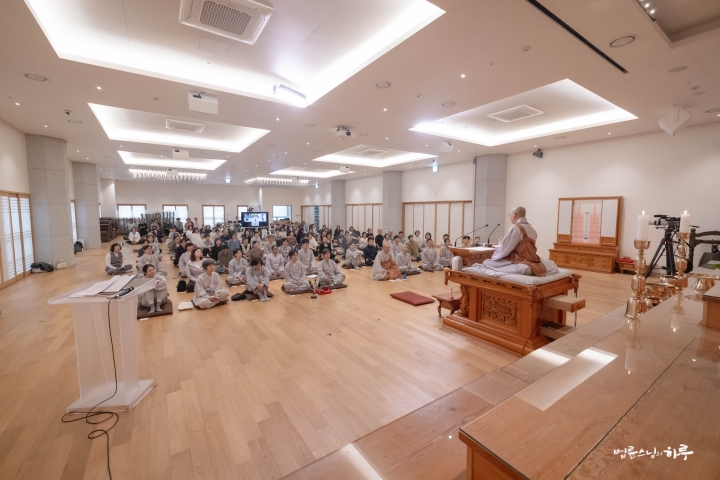
Sunim then shared the news of Dharma Teacher Hyangryoo’s passing and asked Jungto members to join in wishing her peace. Afterward, he began taking questions from those who had registered in advance. One person asked a question online, followed by two people raising their hands at the venue. One of them sought Sunim’s advice about her fears of having a child despite being married for 15 years.
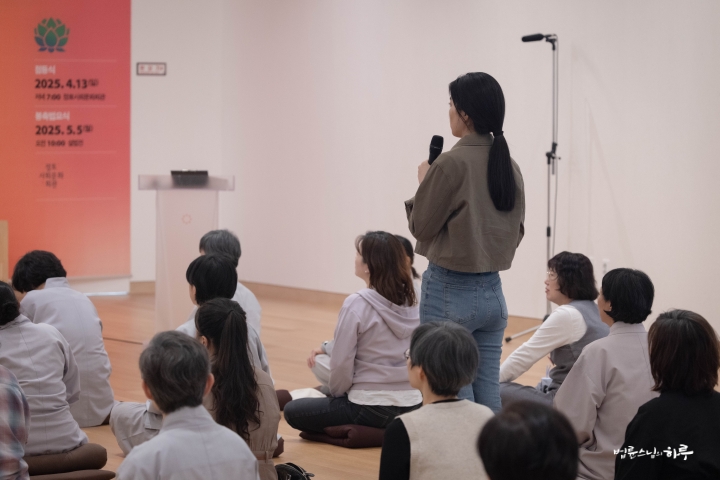
I’m Afraid to Have a Child, But Afraid of Being Lonely Without One
“From your perspective, does Venerable Pomnyun Sunim seem to be living happily or miserably?”
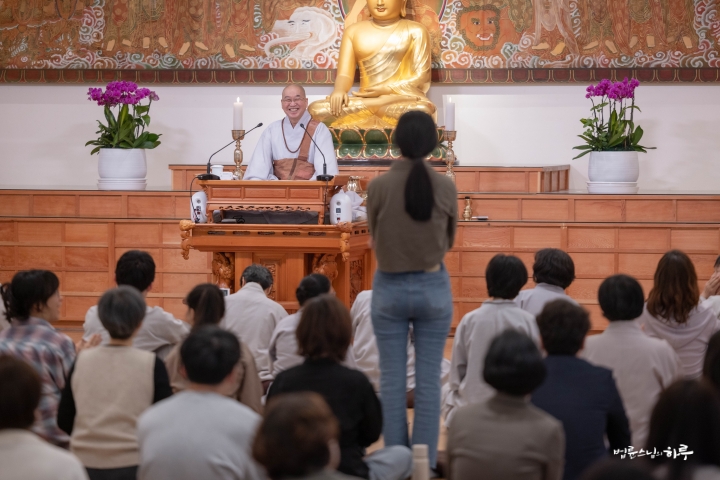
“I think Venerable Pomnyun Sunim wouldn’t be lonely because of your high reputation. You seem to have many concerns, but you don’t appear to be unhappy.”
“That’s right. Venerable Pomnyun Sunim is not married and has no children, yet lives well. But you have a husband and live as a couple, even without children. So why not think, ‘If Sunim can be happy living alone, there’s no reason we can’t be happy living together as a couple’?”
“Sunim, you have the ability and energy to help many people in need, and many people follow you. I’m just an ordinary person with limited energy and abilities, so it’s difficult for me to have people around me.”
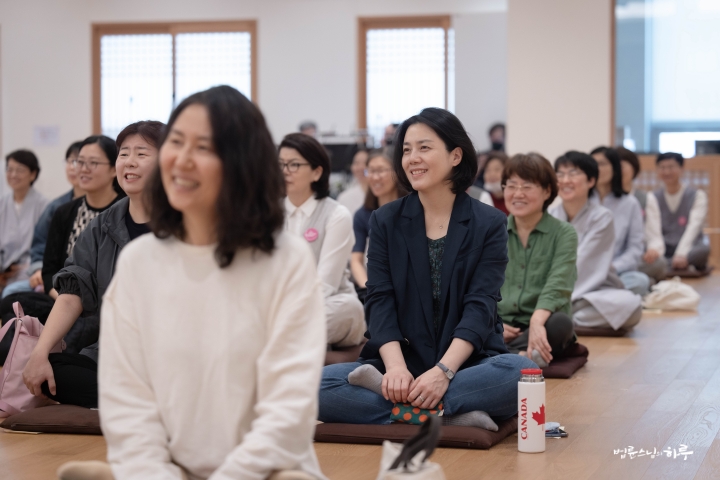
“Having many people around means having a lot of work. You say you can’t even have one child because it’s too difficult, yet you seem to think it’s fine for me to live among countless people. You envy your friends having babies but find having your own child troublesome, and yet you seem to admire my relationships with many people. But when you have many people around you, many difficulties arise. You worry about your child dying early, but for someone like me who has relationships with so many people, someone is always dying. Here, there, yesterday, today—people pass away. Sometimes people I’ve worked with for years suddenly die. As the saying goes, ‘A tree with many branches cannot avoid the wind.’ It may look good from the outside, but the reality is different.
In rural areas, people used to envy families with many children because they had more hands for farming. But that was only from a labor perspective. In reality, mothers with many children say it becomes more difficult to manage as the number increases. Yet neighbors think, ‘That family must have it good with all those grown children earning money and helping out.’ You’re looking at the situation from that same perspective. Not just me, but many people who live alone are happy. You’re living as a couple, so there’s no reason you can’t be happy. And many couples have several children and live well. There’s no reason you can’t live well with one or two children either.
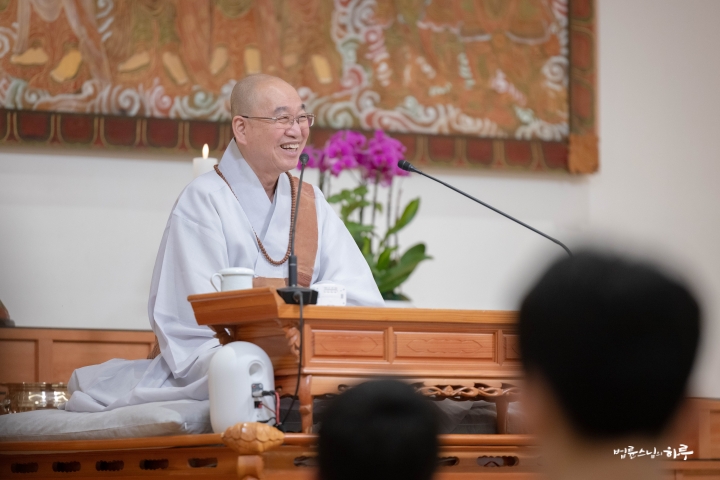
If you have a baby, that’s fine. If not, you can live with just your husband. If you have a baby, think, ‘My mother raised five children, so why can’t I raise one?’ And if you don’t have a baby, think, ‘Sunim lives well on his own, so why can’t we live well as a couple?’ Then it’s okay whether you have a child or not.”
“But I’m older, so I can only have one child. If that child dies, I feel like the sky would fall.”
“Why would the sky fall? You didn’t have a child before. You lived well without a child, so what’s the problem if you have one and then don’t?”
“But Sunim, doesn’t your heart ache when someone you work with passes away?”
“So what if my heart aches a bit? Even when this cup I drink from breaks, I feel sad. Of course I’d feel regret when a person dies.”
“But it’s hard to overcome that pain.”
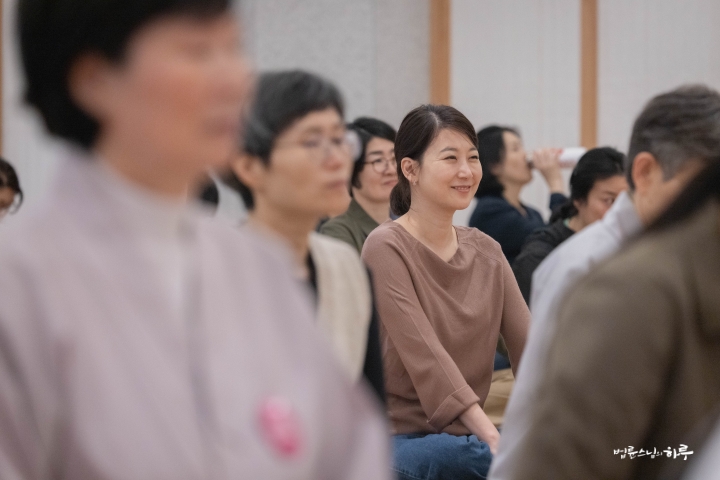
“If you think it would be that difficult, then don’t have a child. When people I work with pass away, if I found it unbearable, I would have to cut off relationships and live alone. I could go live alone in the mountains, cutting off all worldly connections, and then no one I know would die—because I wouldn’t know anyone. That’s one way to live. But when people form many relationships, inevitably many people will die. This isn’t about which way of living is better or worse. You said you can only have one child, so if that child dies, your heart would ache more. But wouldn’t your heart ache even more if you had two children and both died?
“I suppose that’s possible.”
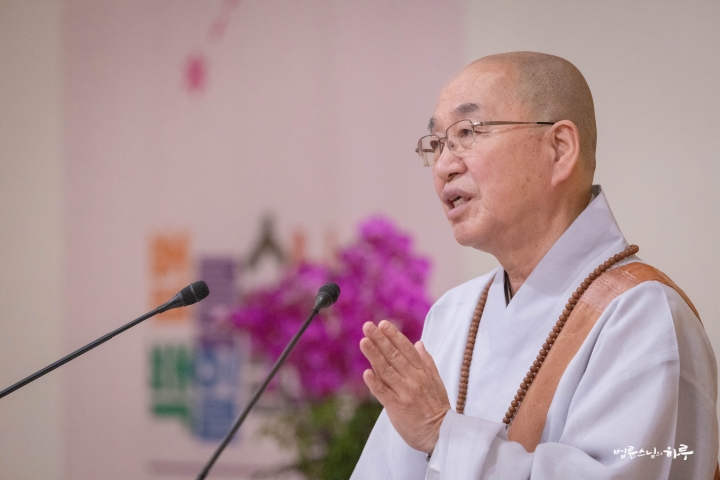
You’re not ready to have a child yet. When a dog gives birth to puppies, does it worry beforehand about how to raise them? All animals just give birth without worrying about raising their young. But you’re constantly worrying, ‘How will I raise a child if I have one?’ However, once you have a child, you naturally find ways to raise it. Before having a baby, people worry a lot about how to raise it, but once the baby is born, even your physical structure changes to produce milk. Similarly, your thinking changes too. You start thinking, ‘I must protect my baby no matter what!’ Sometimes a mother will think she must save her child even at the cost of her own life. For example, imagine you’re nursing your baby and a bomb falls right next to you. Could a mother abandon her baby and run away? That doesn’t happen. Couples who claim they can’t live without each other might quickly forget their partner and run for their lives when a bomb falls, but a mother with a baby is different. She instinctively shields the baby with her body for protection. Similarly, before having a child, you worry intellectually about many things, but once you have a child, your perspective changes. That’s why anyone can have and raise children.
You don’t meticulously plan how to raise a child before having one. If a child comes, you have it, and once you have it, you raise it. Of course, some people abandon their children, but those cases involve people who aren’t mentally sound. They’ve become obsessed with certain thoughts and developed mental issues. Any mentally healthy person will try to raise their child even at the risk of their own life.
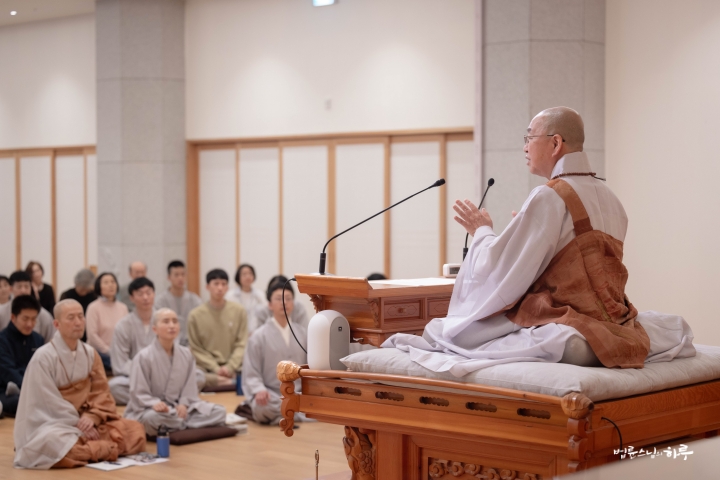
Our society has created various problems by setting excessively high standards for raising children. People receive so much external education about how to give birth and raise children that they develop anxieties like “Can I really have a child and raise them properly?” or “How will I manage the cost of childcare?” These concerns ultimately lead to the side effect of people choosing not to have children. Ironically, those who don’t overthink how to raise children end up raising them naturally, just as dogs raise puppies or hens raise chicks. Therefore, it’s foolish to expect that simply providing a small amount of money will increase the birth rate.
To increase the birth rate, first, housing must be more accessible. Second, the childcare process needs to be more equitable. All children should receive adequate knowledge through school education, and private education should be eliminated. The structure should be that mothers care for babies briefly after birth, daycare centers take responsibility from age three, and the government handles education from kindergarten through middle school. This would significantly reduce the burden on parents. Third, we need to lower social expectations about raising children well. In the past, it was acceptable to leave children at home while going to the market or stepping out briefly, but now this could be considered child neglect. Raising one child today has become more difficult than raising several children in the past. That’s why everyone fears raising even one child. When raising a child becomes frightening, people think it’s better not to have one at all.
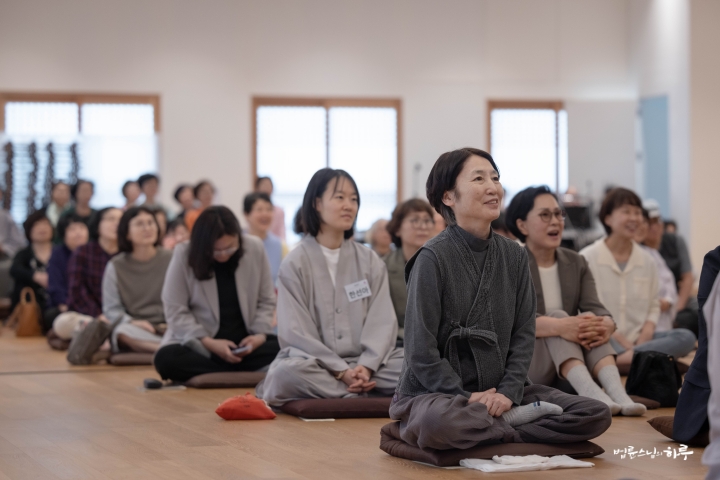
Rather than overthinking this, it would be better not to have children at all. If you want to have and raise children, you shouldn’t be calculating so much. There’s no need to complicate the issue of having children. Just adopt the perspective that if pregnancy happens, you have the child, and if it doesn’t, you don’t.
Also, if you and your husband have agreed, “It’s already difficult for just the two of us to live, so let’s live without children,” then it’s perfectly fine not to have them. In the future, it will become impossible for children to support their parents anyway. In the past, people had many children, so although raising them was difficult, at least one of them could take care of their parents in old age. But nowadays, when people have only one or two children, those children, once married, would have to care for four parents from both families. Therefore, we should rely on social security systems for our old age rather than expecting our children to solve everything. Whether you have children or not, you need to recognize that you must take responsibility for your own old age.
If you’re worried about being lonely in old age without children, you can volunteer at a daycare center. There are many children there. You can play with them and take care of them. The problem is attachment to “mine.” The thoughts of “my child” and “my grandchild” are the issue. If you let go of attachment, every child who isn’t cared for by their parents becomes your child. Even if you have grandchildren, in today’s world, it’s rare for grandmothers to be entrusted with childcare. The reality is that even with grandchildren, it’s difficult to see them once a month. So volunteering at a daycare center even once a month to play with children can alleviate loneliness in old age much more effectively.
You don’t need a big house either. It’s because you think of it as “my house” that you spend money maintaining it, and because you think of it as “my vacation home” that you waste money and energy keeping it up. But think about it—how many times a year do you actually go to your vacation home? It’s much more economical to stay in shared accommodations when needed. If I use it, it’s mine; if I don’t use it, it’s not mine. Life is always tiring because you think in terms of my child, my things, my house, my money. This is all just one thought. If you let go of this one thought, there’s no problem at all.
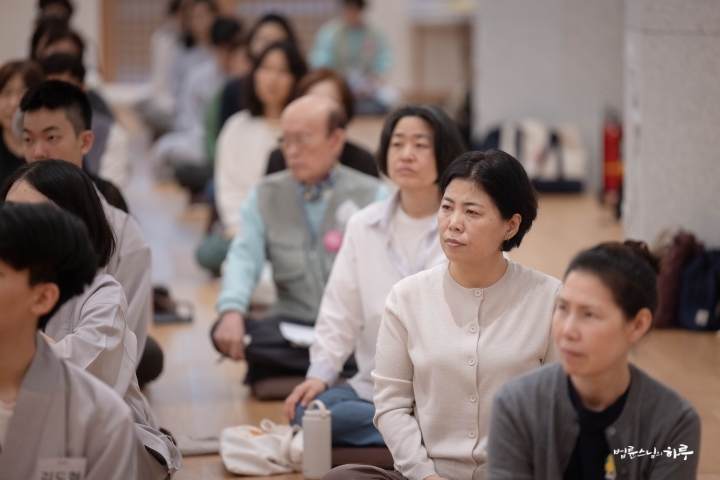
So there’s no need to think, “Should I have a baby or not?” And the baby issue isn’t something you can decide alone. If you and your husband discuss it and both agree to have a child, then you can have one and live together. If you find that you really can’t raise the child, you can give them up for adoption. After all, the baby didn’t exist before anyway. For example, let’s say I lived well without money, and then someone gave me 10 billion won. If I used that money for a few years and then lost it, would it have been better never to have had it at all? Or would it have been better to have enjoyed it for a while? Obviously, it’s better to have had it, even briefly. Yet people don’t suffer when they never had something to begin with, but they suffer when they have something and then lose it. Objectively speaking, you could do without it, but attachment forms simply because you’ve experienced it once. The same applies to children. Even if a child passes away, if you had time together, that alone is something to be grateful for.

Marriage is the same way. If you don’t have a clear goal for living alone, just try living together. If you find you’re not compatible, you can get divorced. Even if you end up living alone again, having the experience of living with someone gives meaning to your life. Divorce isn’t such a big deal. That’s why I don’t bat an eye when someone tells me they’re getting divorced. I comfort them by saying, ‘At least you lived together for a few years, which is better than being a monk like me.’ The issue isn’t whether you got married or not, or whether you had children or not. The problem is constantly overthinking things. ‘What if I do this? What if that causes problems?’ This kind of overthinking makes your head hurt. This is exactly what suffering is.”
“I understand.”
“Your hair is too long. Why don’t you try cutting it? Maybe that would help reduce your overthinking?” (laughter)
“Thank you. I’ve made up my mind.”
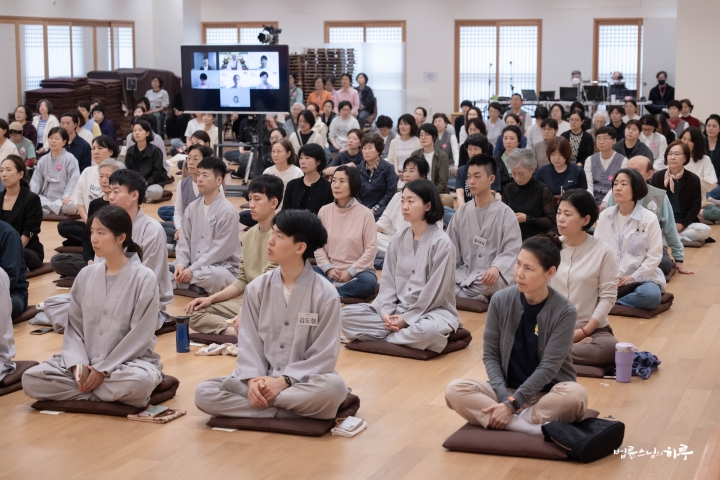
Questions continued to come in.
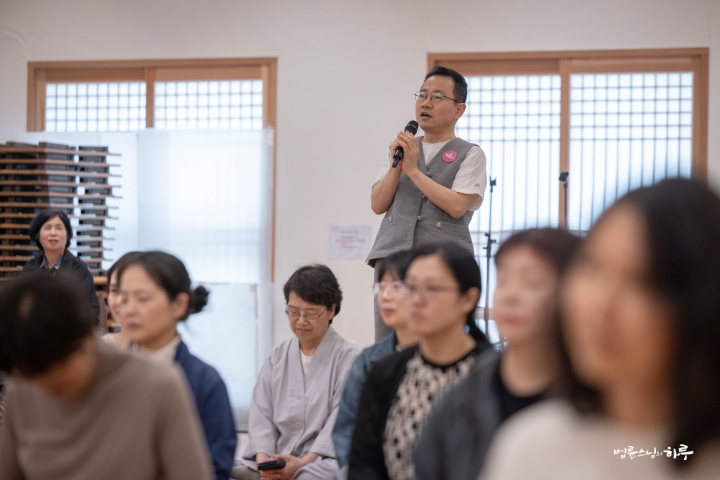
• We’re having difficulties with a young leader who recently joined our team and makes decisions unilaterally.
• President Trump is causing global confusion these days. Could a China-Japan-Korea FTA help counter the United States?
By the time the conversation ended, it was almost noon. Sunim concluded the live broadcast, looking forward to next week’s Dharma Assembly.
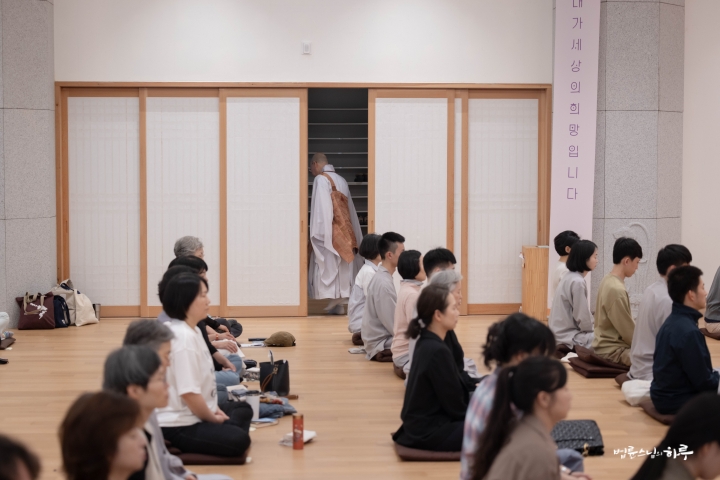
After lunch, at 1 PM, Sunim attended a Peace Foundation research seminar on “The Crisis of the Korean Economy: Is New Growth Possible?” held in the Peace Foundation conference room.
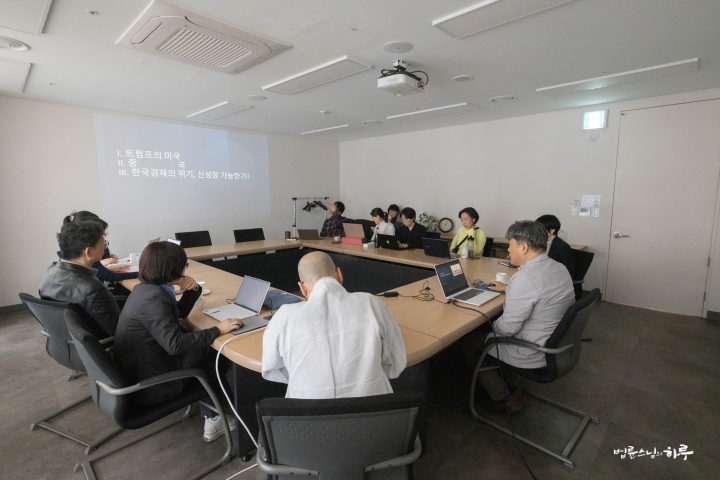
Dr. Kwak Soo-jong from the Rien Economic Research Institute shared extensive insights about Trump’s America, China’s response, and Korea’s strategy.
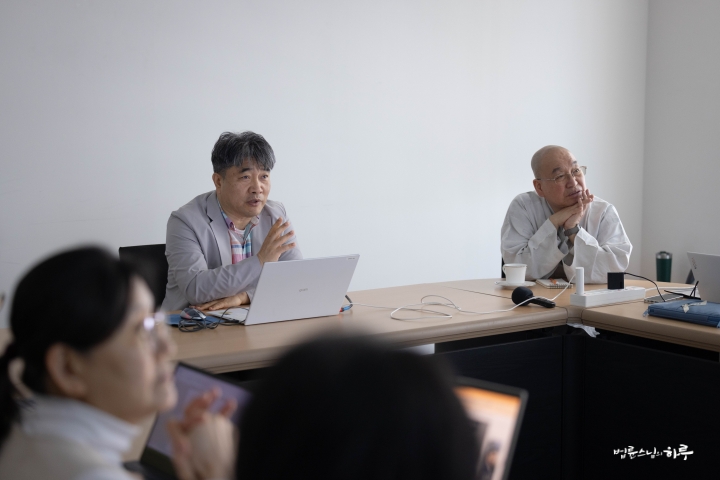
“The United States has passed its peak and is now in decline, while China is on the rise. This is precisely what concerns American society. The collapse of science, technology, and education is what America fears most. With interest rate policies, trade balances, and the dollar’s status as the world’s reserve currency being shaken, the United States has turned to protectionist measures like ‘tariff wars’ to maintain its hegemony.
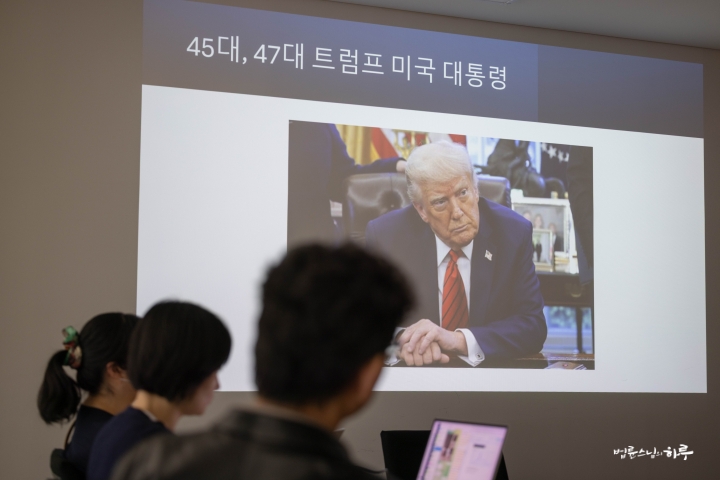
Changes in World Order and Korea’s Strategy for New Growth
China has PTSD (Post-Traumatic Stress Disorder) from war. That’s why they’re strengthening their military. China is riding an upward trend in all indicators—trade, education, science and technology, and military power. Since joining the WTO, China has grown rapidly, challenging America’s dollar hegemony, and pursuing military and economic expansion strategies to position itself as a global leader.
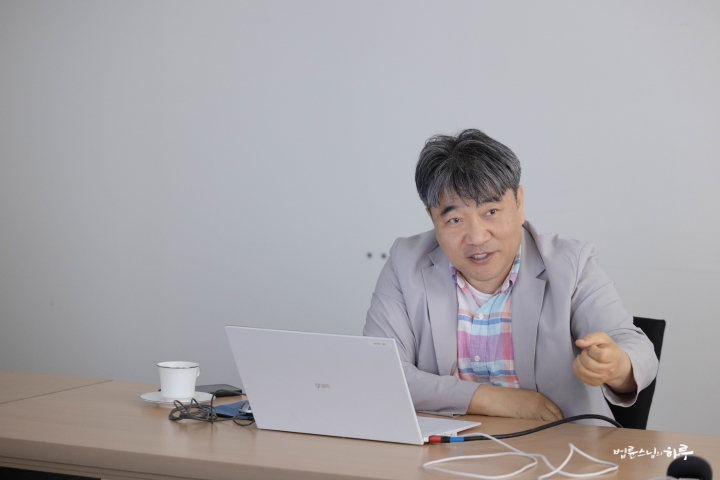
South Korea is currently in an awkward state where its national growth curve cannot advance to the next level. It’s behaving like a nouveau riche in a wealthy country. For further growth, people in their 30s and 40s need to step up. Korea still has potential, but faces challenges in civic awareness, policy implementation, and efficient resource allocation.
Education is the starting point for national growth. Education must support science, technology, and competitiveness. But politics is the problem. If the president or members of parliament don’t study, the country could collapse. Truly intelligent people understand how tariffs affect the financial system. Korea’s new growth requires political insight, national investment in education, accurate understanding of global affairs, and practical diplomatic strategies.
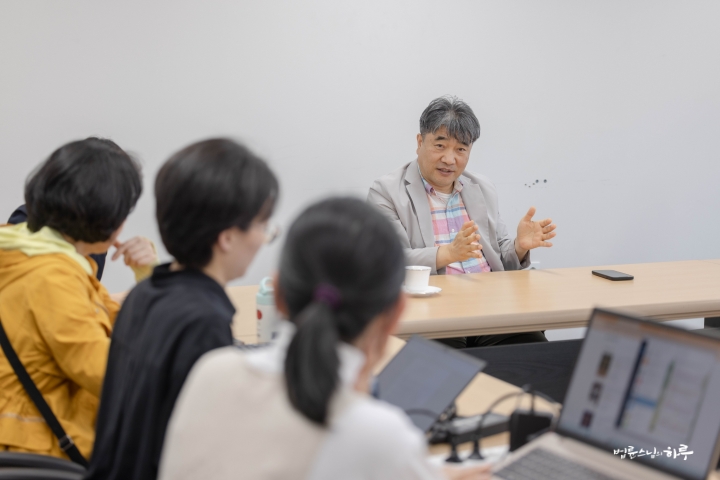
The clash of civilizations is not simply an ideological confrontation but a structural conflict between consumer nations (the United States) and producer nations (China). Europe sides with the United States because its trade deficit with China is larger than America’s. In the context of a clash of civilizations, economic conflict between China and the United States is inevitable, and South Korea must conduct diplomacy with a flexible yet firm attitude between the two sides.”
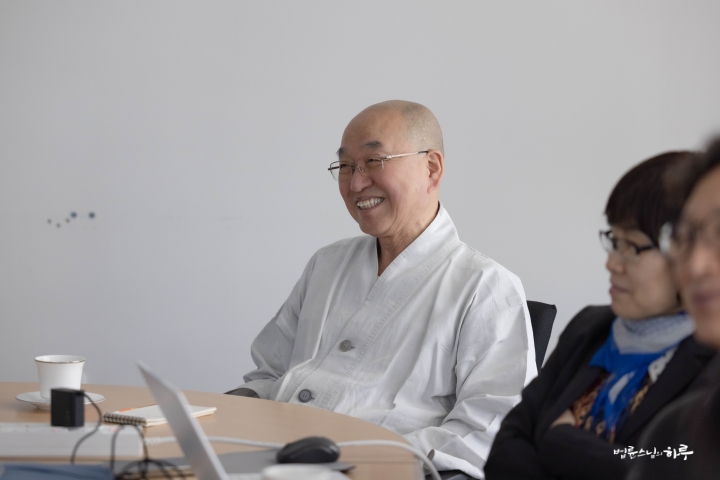
After the two-hour lecture, there was a Q&A session. Various questions about Korea’s economic crisis and alternatives followed. The discussion encompassed not only economic analysis but also politics, diplomacy, civic awareness, and US-China relations, offering deep insights into Korean society’s present and future. After taking a commemorative photo together, the April Peace Research Seminar concluded.
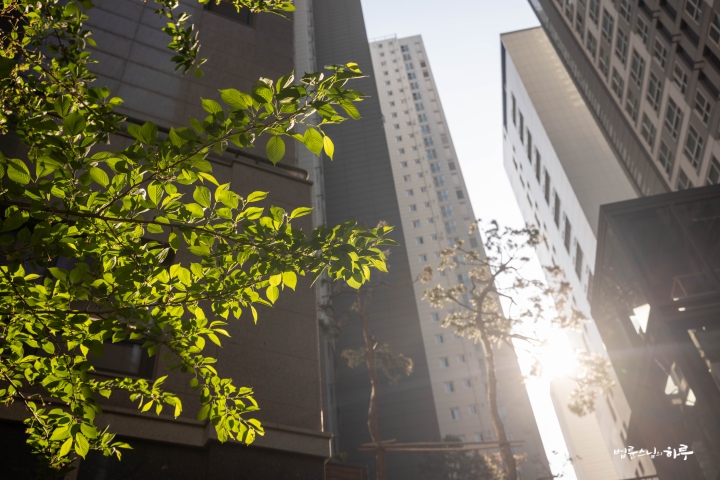
At 4 PM, Sunim attended the Peace Foundation Planning Committee meeting. For two hours, they discussed the current political situation in South Korea, changes in inter-Korean and US-North Korean relations following President Trump’s tariff negotiations, and the Peace Foundation’s role within this context.
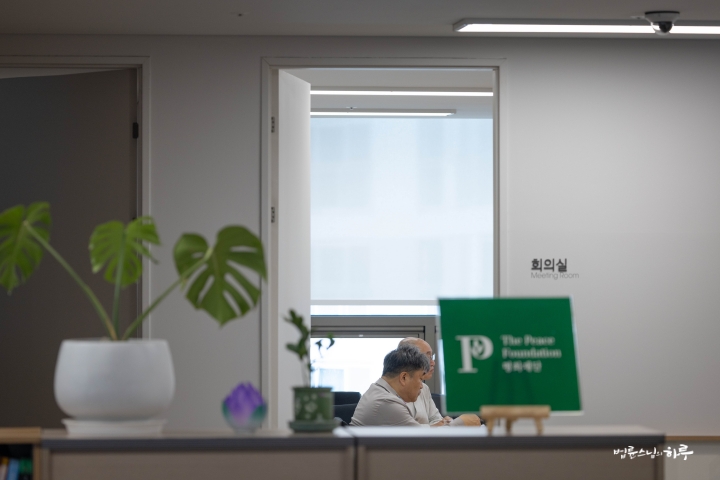
By the time the meeting ended, the sun was setting. Many citizens came to the Jungto Social and Cultural Center to attend the 100-Day Dharma Talk, enjoying the fresh spring breeze.
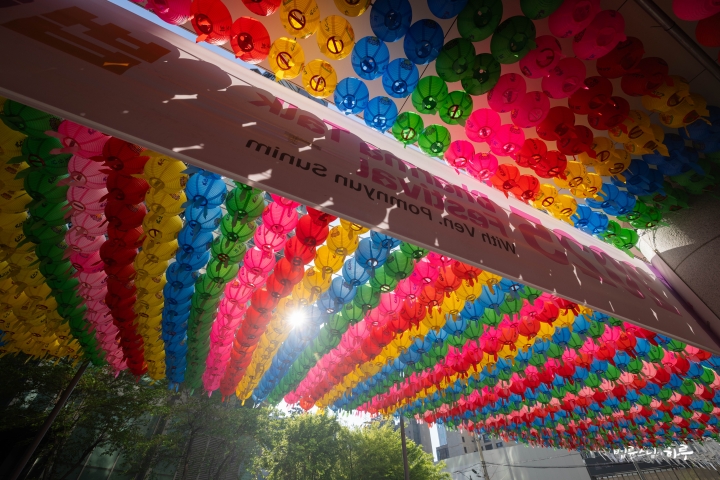
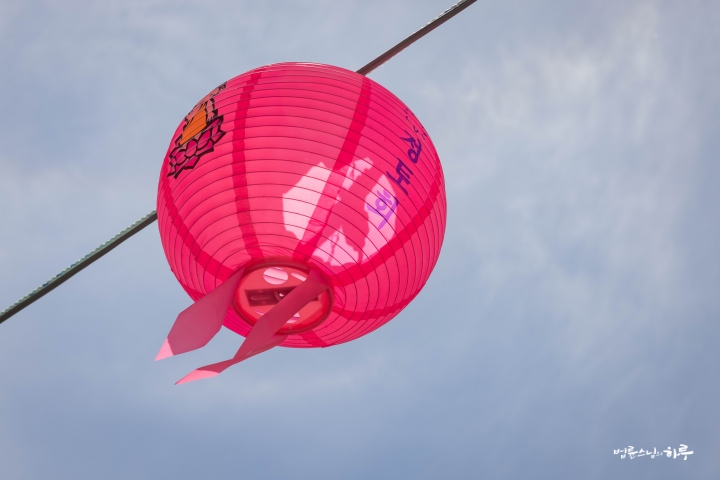
At 7:30 PM, Sunim conducted the evening session of the Dharma Assembly live broadcast. About 100 people gathered in the third-floor Dharma hall, while Jungto Society members connected through an online video conference. They requested Sunim’s teaching with three bows.
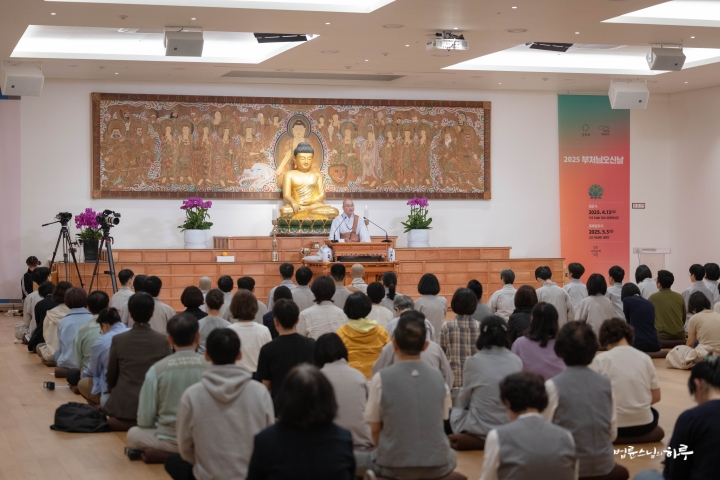
Like in the morning assembly, Sunim expressed condolences for Pope Francis’s passing before taking questions from Jungto Society members. Two people asked questions online, and two raised their hands at the venue. One person asked Sunim for advice on how to overcome the guilt of not being present at their mother’s passing, who died suddenly from a heart attack.
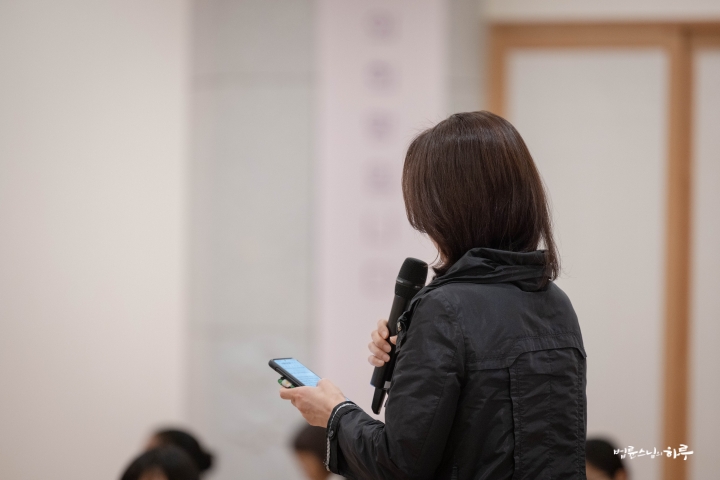
How Can I Overcome the Guilt of Not Being Present at My Mother’s Passing?
“What illness caused your mother’s sudden passing?”
“She didn’t have any illness; she passed away suddenly from a heart attack.”
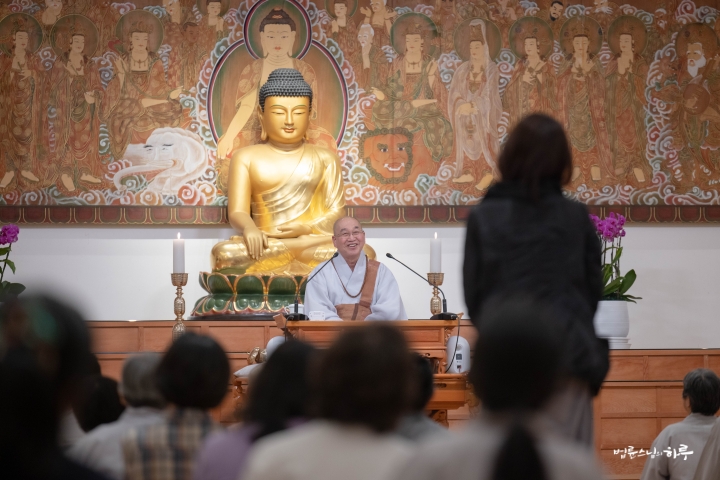
“If she died suddenly from a heart attack, do you think your mother experienced great pain or not?”
“I think she might have experienced pain momentarily.”
“That’s your assumption. Deaths from heart attacks are known to involve almost no suffering compared to cases where people suffer for years in intensive care. So are you sad because your mother suffered, or because you couldn’t see her?”
“My mother worked hard all her life, and in her later years, she was so happy, saying, ‘I couldn’t be more comfortable.’ I feel sad that she couldn’t enjoy that life longer.”
“Whose thought is that?”
“It’s my thought.”
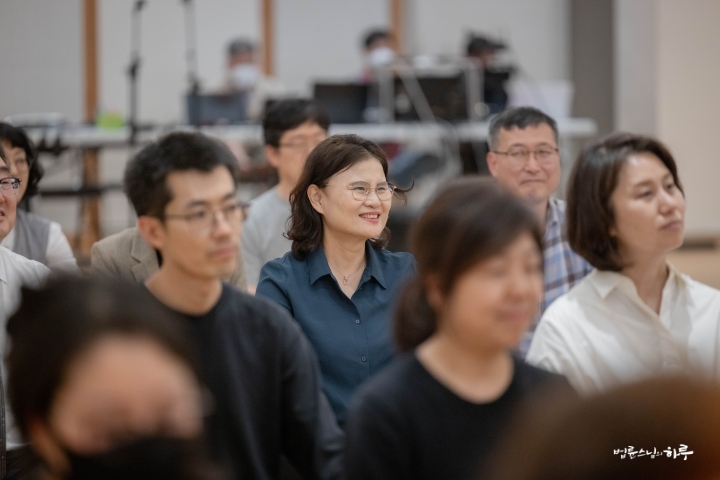
“From your mother’s perspective, passing away suddenly while comfortable—isn’t that a good death? Imagine if your mother had been hospitalized in intensive care, and you couldn’t work because you had to care for her for a long time. After about three years, you would be exhausted, and seeing your mother suffer would be painful. By then, you might think, ‘Wouldn’t it be better if she passed away rather than living like this?’ If she had passed away then, you wouldn’t feel as sad as you do now. So this sadness isn’t because of your mother but from your own regret. To eliminate that regret, your mother would have had to suffer for three years. Elderly people in rural areas often tell me, ‘Sunim, I have one last wish. I want to die peacefully in my sleep.’ They’re terrified after seeing friends suffer for years in nursing homes before dying. They’re not afraid of death itself but of suffering for so long. So they say, ‘How wonderful it would be to just die in my sleep.’ Then I respond:
‘Oh, grandmother, you’re quite greedy. If you die suddenly like that, what about your children?’
When someone passes away suddenly, their children feel immense sadness. Conversely, if children care for a parent who suffers for years, the burden of caregiving makes the eventual passing less painful. So I tell the elderly, ‘You should get sick, be hospitalized, go to a nursing home, and let your children clean up after you—you need to experience some suffering.’ Eventually, the children become exhausted and think, ‘Wouldn’t it be better if they passed away rather than living like this?’ By that point, when death comes, although there’s sadness, the family can process their emotions more quickly after the funeral. We call this ‘detaching emotionally.’ For the children’s sake, parents should experience some suffering before dying. Dying suddenly causes too much grief for the children. If children struggle to care for their parents before they die, the children gain satisfaction from knowing, ‘I did everything I could for my parents.’ This brings peace of mind even after the parents pass away.
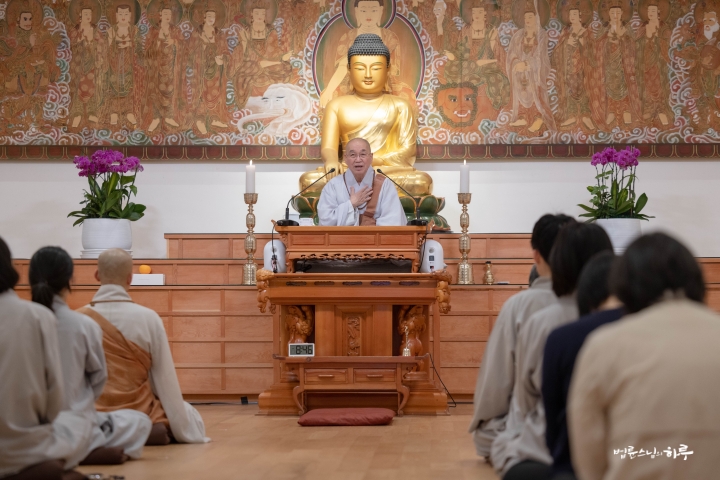
So what about from a child’s perspective? The sadness you’re feeling now actually has nothing to do with your mother—it’s your own sadness. If you truly think about what’s best for your mother, the ideal death would be passing away peacefully from a heart attack while sleeping. I know someone whose mother had been preparing feed for livestock and lit the fire in the evening. When they opened the door in the morning, she had passed away quietly. Another person went to the field carrying an A-frame carrier, set it down, sat in a sunny spot, and passed away right there. When the sun set and he hadn’t returned home, the family went looking and found he had passed away. As children, we feel sad about this. But from the deceased’s perspective, what greater blessing could there be?
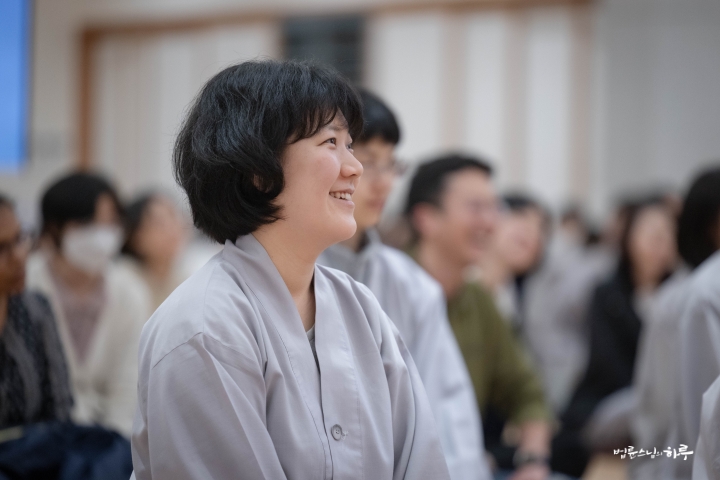
You might think a heart attack would be extremely painful, like being strangled, but it’s not like that. They just gently pass away. All elderly people wish for such a death. I myself could have a myocardial infarction because one of my arteries is blocked. The doctor suggested putting in a stent to expand the artery, but I have a reason for refusing. While others might worry, I’m doing this for myself. I want to just quietly pass away at some point. It’s much better than dying in a hospital bed. If I die that way, you all would probably be upset. But that’s your concern—I don’t really have much intention of being considerate in that way. (Laughter)
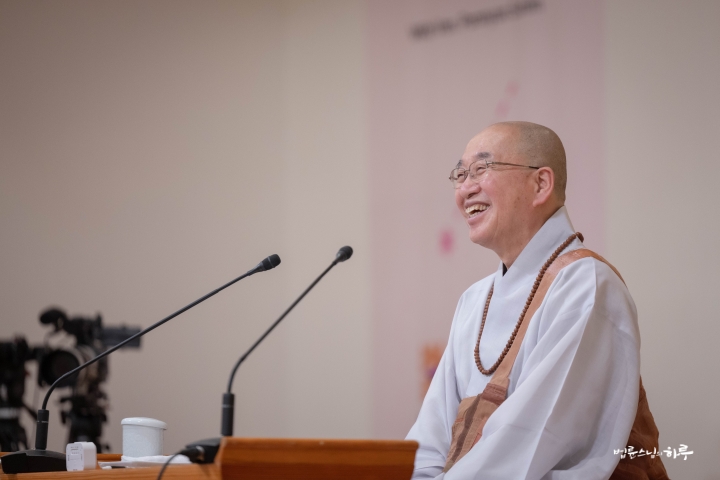
Your mother didn’t have a heart attack because you went to a temple for volunteer works, nor would she have avoided that illness if you had stayed with her. There’s actually no connection, but you keep fixating on it. Your mother asked you to stay with her, but you didn’t listen and went to the temple, and it happened that your mother passed away then. You keep obsessing over thoughts like “If I hadn’t gone, would she still be alive?” and that’s why you feel sad. But your mother has already passed away. Why do you keep thinking only about yourself? If you’re truly thinking about your deceased mother, she passed away in the most peaceful way possible. It’s you who feels regretful, not your mother. You should think, “Mother passed away peacefully, without any pain.” Isn’t it good that she passed away during a happy moment? Does someone have to die during an unhappy time?
I don’t have thoughts of deliberately dying either, but I wouldn’t worry if I went to sleep tonight and didn’t wake up tomorrow morning. I’ve built the Jungto Social and Cultural Center, I’ve given the 100-Day Dharma Talks to my heart’s content—what is there to worry about? It would be a good thing to die while giving Dharma talks. The problem is that it’s the living who feel regret. You keep thinking “I’m doing this for my mother” when it’s actually your own regret. It has nothing to do with your mother. If you want to cry, cry as much as you need to. But understand that this is your issue—don’t drag your mother into it. You need to shift your perspective to “I’m crying because I feel regretful.”
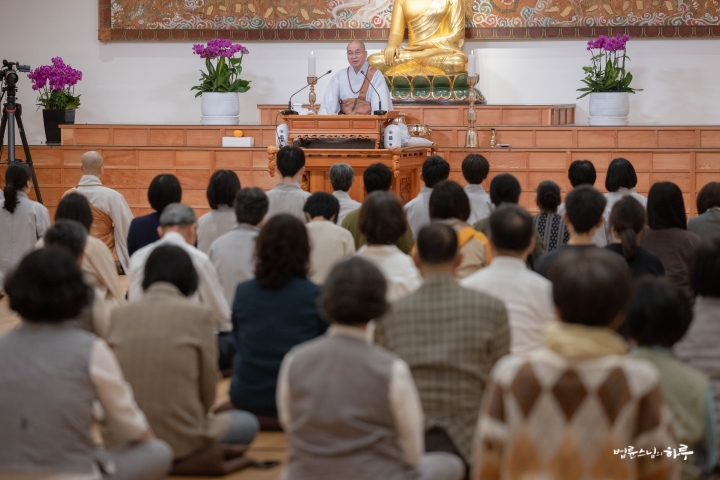
Your mother has already passed away peacefully, so there’s no issue there. The problem is that you feel regretful about not having done more for her while she was alive. If you have such regrets, you can fully devote yourself to your father to make up for what you couldn’t do for your mother. But you’re also saying, “I need to take care of my father and participate in Jungto Society activities, which is difficult.” If you truly feel remorse about your mother, you should focus on doing enough for your father. If you’ve genuinely reflected on this, there’s no need to mention Jungto activities anymore. Now you should come to your senses and take good care of your father.
You didn’t cause your mother’s death; she simply passed away. What if you had been in the next room as you wished but still didn’t know? You might have felt even worse, thinking, “Oh, I should have opened the door to check on her…” Your mother’s death was not something you could control. If you’ve reflected even a little, stop dwelling on the past and be good to those who are still alive. If you had caused her death, you would need to take responsibility, but your mother lived a life of hardship and ended her days peacefully. She lived a very good life.
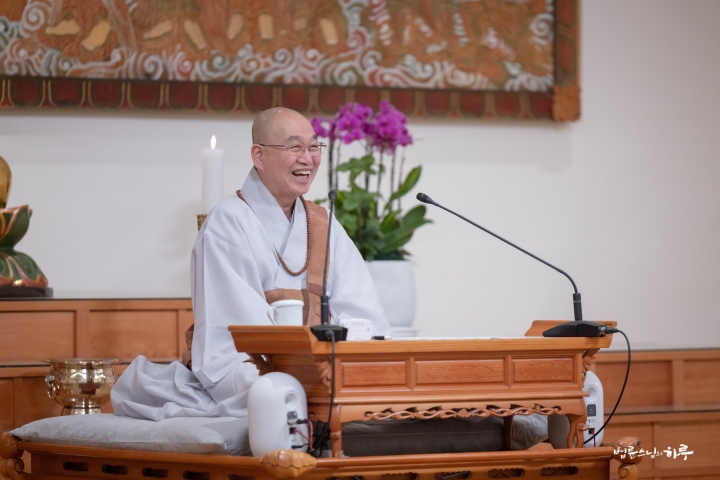
If your mother has passed away and your father is struggling alone, you can comfort him. If taking care of your father becomes difficult, it’s okay not to do so. When we become adults, we each need to live our own lives. Help if you can, but there’s no need to feel guilty if you can’t. If you want to be active in Jungto Society, you can do that. If you want to stop your Jungto activities and focus on caring for your father, you can do that too. If you want to continue with Jungto while caring for your father, that’s also fine. This falls within the realm of your freedom. There’s no “this is better” or “that is worse” – it’s your choice to make.
Your worry stems from foolishness and is a waste of emotion. Your mother won’t come back to life just because you’re sad. If your father needs your help, you can stop coming to Jungto Society and take care of him. Taking care of your father is also part of a practitioner’s duty. However, if caring for your father alone doesn’t bring you peace of mind, you can both attend Jungto Society and care for your father. Crying won’t solve anything. What’s done is done. Rather than dwelling on having fallen, it’s more important to be careful not to fall again. Now, what’s needed is to ensure your father has no regrets. If you adopt this perspective, your suffering will disappear.
“Thank you. I understand now.”
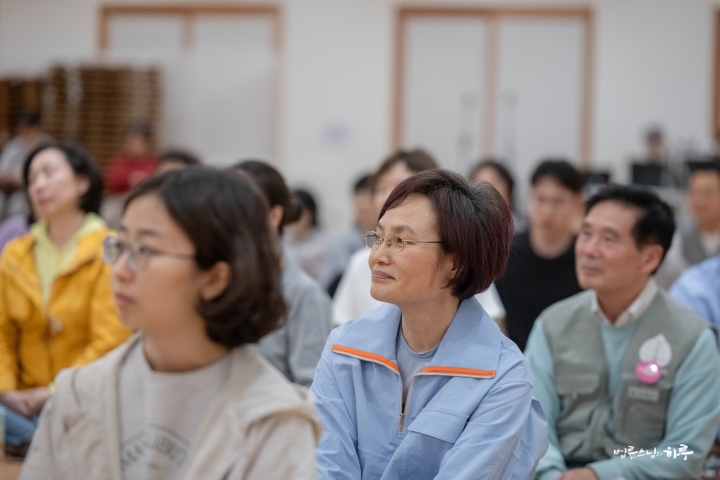
The questions continued.
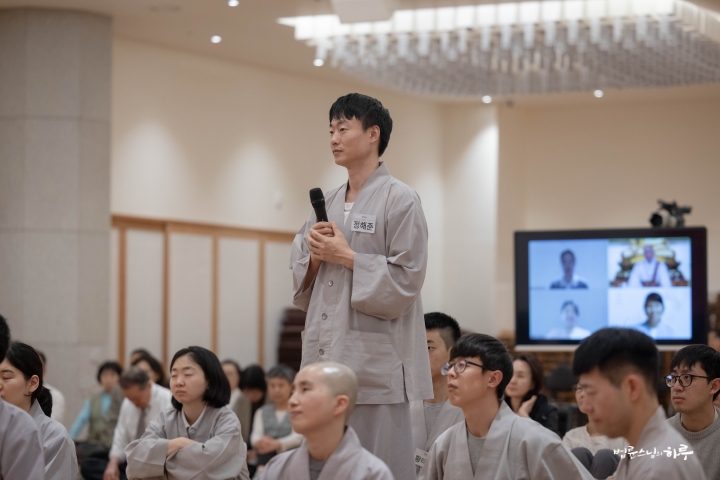
I was a leading member but became a general member due to not meeting the requirements. Since then, I’ve barely managed to volunteer without practicing diligently, and I can’t focus my mind. What should I do?
I was given a practice task to bow my head and say “Yes, I will,” but I find it difficult to bow to people who have double standards or blame others.
Sunim, you mentioned that future society will shift to a volunteer system. But we need money to live in this world, so how is a volunteer system possible?
Everyone applauded the person who courageously asked these honest questions. By the time the conversation ended, it was well past 9 PM. The participants sat in circles by group for mindful sharing, while Sunim left the Dharma hall and headed to the Jungto Center.
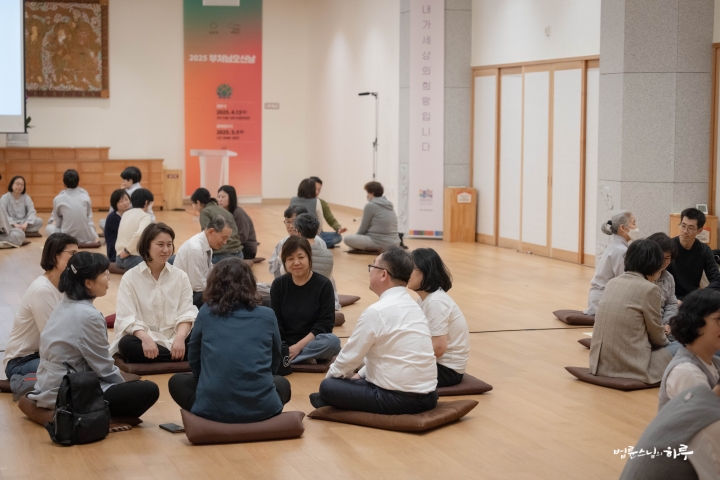
Tomorrow will be the 67th day of the 100-Day Dharma Talk. Sunim will start early with a breakfast meeting with North Korea experts at The Peace Foundation. In the morning, he will give the first lecture on the Heart Sutra at the Dharma hall on the third floor of the Jungto Social and Cultural Center, and in the evening, he will deliver the 14th lecture of the Buddhist Social Studies Course in the main auditorium in the basement.





Gratitude envers la personne qui m’a fait découvrir ces articles quotidiens.
La lecture de ce premier article m’apporte beaucoup.
Je retiens particulièrement ce proverbe que je n’avais jamais entendu : “Un arbre avec de nombreuses branches ne peut échapper au vent”.
Oui, forcément, plus on a de personnes dans son entourage, plus on a de difficultés qui surgissent inévitablement. Moi qui affectionne tant la solitude, je n’avais pourtant jamais réellement vu les choses sous cet angle.